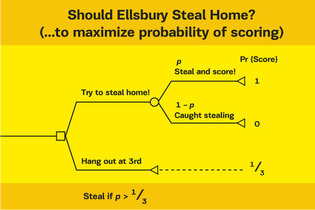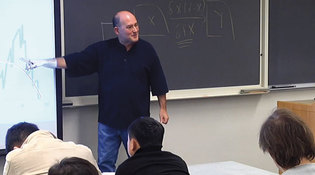 loading
loading
Sporting LifeOff the field and into the classroomUsing sports to study statistics, history, and culture. Evan Frondorf ’14 was a production associate for NBC’s broadcast of the Summer Olympics in Rio.  View full image Courtesy Yale School of ManagementSchool of Management professor Ed Kaplan (above) uses situations from sports (top) to teach students about how statistical modeling can inform decisions. View full imageIn 2011, Yale School of Management professor Ed Kaplan was looking for a way to hook students on statistical modeling. His courses about using statistics to inform policy decisions draw a variety of students, he says, but there’s “a whole swath of people” who aren’t necessarily interested in issues like disease control and counterterrorism. His solution was Sports Analytics: a class that introduces novices to modeling using real-world sports applications. The questions range from endgame situations in basketball (should a team go for three to win or take two points to send a game into overtime?) to the development of models quantifying the value an individual hockey player adds to an NHL team. A renowned operations researcher by training, Kaplan was always a major sports fan but never an athlete himself (“unless you count probability as a contact sport”). But he also knew that sport can stand on its own as a field of academic study—a rich subject flush with history, intertwined with politics, and currently marked by an injection of analytics and science. “It turns out there is a lot of really fascinating sport-specific modeling going on,” he says, “showing how you can have serious discussions about some of these topics rather than just anecdotal ones.” Kaplan’s is just one of several classes created in the last few years at Yale to look at sports, not only in the realm of statistics, but also through the lens of history and culture. Until his recent departure to become president of Ferrum College, Jonathan Edwards College dean Jody Spooner ’91 taught an American Studies seminar on Sports, Civil Rights, and American Leadership. Classics lecturer George Syrimis offers a course on the ancient and modern Olympics. And Angela Gleason teaches a popular Yale College seminar called History of Sport. She says the course originated as a suggestion from a history department chair who observed increasing interest in the history of athletics. “Why wouldn’t it be important to teach an aspect of society that has captured our imagination for more than a century?” Gleason asks. “Exploring how we sport, as individuals and as a society over time, is instructive in understanding who we are and what we do.” Former Yale Daily News sports editor Grant Bronsdon ’16 took both Spooner’s and Gleason’s courses. He says his biggest takeaway has been “the role that sports have had in moving society forward, citing examples like Jackie Robinson and Muhammad Ali. The sports-in-the-classroom movement shows no signs of slowing down. Kaplan recently worked with an undergrad on his senior economics thesis and has seen alumni of his course go on to work for professional teams. In May, Toby Moskowitz joined the School of Management as the Dean Takahashi Professor of Finance. While he’s one of the world’s top financial scholars, Moskowitz is perhaps best known in the public sphere for his work on sports, including his book Scorecasting, cowritten with Sports Illustrated writer L. Jon Wertheim ’93. After more than 150 years in Yale’s extracurricular realm, sports are finding more of a place in the curriculum.
The comment period has expired.
|
|